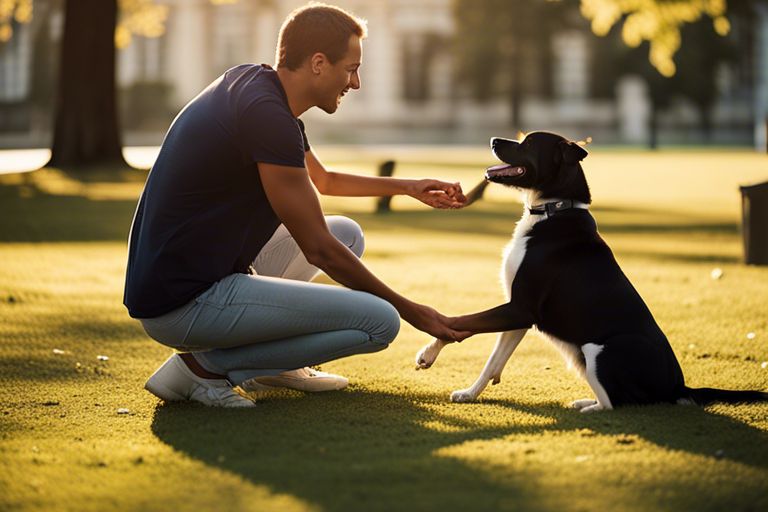There’s no denying the importance of a well-behaved and obedient dog in a harmonious relationship between you and your furry companion. Canine obedience training not only shapes a well-mannered pet but also strengthens the bond and communication between you and your dog. This blog post will explore the various ways in which obedience training can positively impact your relationship with your dog, leading to a happier and healthier partnership. From building trust and respect to enhancing your understanding of each other’s needs, let’s examine into the benefits of investing time and effort into training your four-legged friend.
Key Takeaways:
- Bonding: Canine obedience training strengthens the bond between you and your dog by establishing clear communication and trust.
- Behavioral Improvement: Training helps improve your dog’s behavior, making them more obedient and responsive to your commands.
- Enhanced Safety: Obedience training can enhance the safety of your dog by teaching them to avoid dangerous situations and respond appropriately to potential threats.

Establishing Communication
The Role of Commands in Understanding
To effectively communicate with your dog, you must establish a clear system of commands. Commands are necessary for conveying your expectations to your dog and teaching them how to behave in various situations. By consistently using commands during obedience training, you create a language that your dog can understand and respond to, strengthening your communication with them.
Building a Common Language with Your Dog
On the journey of obedience training, you are not just training your dog to follow commands; you are also building a common language that both you and your dog can use to interact and understand each other better. This shared language enables you to communicate effectively with your dog, leading to a stronger bond and a more harmonious relationship.
With proper training and consistency, you and your dog can develop a deep understanding of each other’s signals and responses, creating a mutual language that fosters trust and cooperation. This common language will extend beyond training sessions, improving your daily interactions and strengthening the bond between you and your furry companion.
Strengthening the Bond
Trust and Respect in the Dog-Owner Relationship
To build a strong bond with your dog, trust and respect are crucial components in the dog-owner relationship. You must establish yourself as a reliable leader through consistent training techniques. When your dog learns to trust and respect you, they become more obedient and cooperative.
The Impact of Training on Attachment
On the flip side, training also plays a significant role in strengthening the emotional attachment between a dog and their owner. Through structured training sessions, dogs learn to rely on their owners for guidance and support, resulting in a deeper emotional connection. This leads to a more fulfilling and loyal relationship.
Understanding the impact of training on attachment is necessary for dog owners looking to enhance their bond with their furry companions. Training not only shapes behavior but also fosters a sense of security and belonging for dogs, strengthening the emotional bond between them and their owners. The structured environment of training sessions provides dogs with a sense of purpose and helps solidify their role within the family unit.
Behavioral Benefits
Improving Social Skills
Your dog’s obedience training can greatly enhance their social skills by teaching them how to interact with other dogs and humans in a controlled and appropriate manner. Through training, your dog learns to understand and respond to different social cues, which can help prevent any aggressive or anxious behaviors when encountering new people or animals. This can create a more harmonious and enjoyable experience for both your dog and those they interact with.
Preventing Problem Behaviors
Socialization and obedience training play a crucial role in preventing problem behaviors like excessive barking, jumping on guests, and destructive chewing. By establishing clear boundaries and rules through training, your dog learns what is expected of them in various situations. This can reduce the likelihood of developing behavioral issues that may strain your relationship and result in frustration for both you and your canine companion.
Skills such as impulse control, focus, and self-regulation are developed through obedience training, helping your dog make better choices and respond appropriately in different environments. By teaching your dog basic commands and reinforcing positive behaviors, you can effectively address and prevent problem behaviors before they escalate, ultimately boosting your bond and communication with your furry friend.
The Advantages of Structure and Consistency
Routine and Its Effects on Dogs’ Behavior
Consistency in your dog’s routine plays a crucial role in shaping their behavior. Dogs thrive on predictability and rely on a structured schedule to feel secure. When you establish a consistent routine for feeding, exercise, and training, your furry friend will learn what to expect and how to behave accordingly. This predictability helps reduce anxiety and uncertainty, ultimately leading to a well-behaved and content companion.
How Consistency Fosters Security and Confidence
To foster security and confidence in your dog, consistency is key. When you consistently enforce rules and expectations, your dog learns boundaries and knows what behavior is acceptable. This clarity creates a sense of security for your pet, helping them feel more confident in their actions and interactions with you and the environment. Consistency in training also builds trust between you and your dog, strengthening your bond and enhancing your relationship.
Advanced Training and Activities
- Keep
| 1. Agility training | 2. Advanced obedience commands |
| 3. Canine freestyle | 4. Nose work |
Beyond Basic Obedience: Fun and Challenging Activities
One way to deepen the bond with your dog is to engage in fun and challenging activities beyond basic obedience training. By involving your dog in agility training, advanced obedience commands, canine freestyle, or nose work, you can provide mental stimulation and physical exercise that will keep your dog happy and well-behaved.
The Role of Obedience in Dog Sports and Therapy Work
Obedience plays a crucial role in dog sports and therapy work. Dogs that have a solid foundation in obedience training are better equipped to excel in agility competitions, obedience trials, or provide comfort as therapy dogs. Training in obedience not only enhances a dog’s skills but also strengthens the bond between the dog and the owner.
To participate in dog sports such as agility or obedience trials, dogs must have a high level of obedience training. This includes mastering commands, focus, and the ability to perform tasks accurately and quickly. In therapy work, obedience is vital as it ensures the dog can follow directions, remain calm in various environments, and interact positively with different individuals.
Conclusion
From above discussion, it is evident that canine obedience training can significantly benefit your relationship with your dog. By establishing clear communication, building trust, and enhancing mutual understanding, obedience training can create a harmonious bond between you and your furry companion. It not only improves their behavior but also strengthens the connection you share with your dog, leading to a happier and more fulfilling partnership. Investing time and effort into obedience training is a worthwhile endeavor that can result in a more obedient, well-behaved, and enjoyable pet that enriches your life in countless ways.
FAQ
Q: Why is canine obedience training important for the relationship with your dog?
A: Canine obedience training is crucial for establishing a clear communication channel between you and your dog. It helps in setting boundaries, building trust, and enhancing the bond between you and your furry companion.
Q: What are some benefits of canine obedience training?
A: Canine obedience training not only helps in preventing unwanted behaviors such as jumping, biting, and excessive barking but also improves your dog’s overall behavior and responsiveness. It also promotes mental stimulation, which is important for a dog’s well-being.
Q: How can canine obedience training improve the quality of life for both you and your dog?
A: By establishing a structured routine through obedience training, you can create a harmonious living environment for both you and your dog. It reduces stress and frustration for both parties, promotes a positive atmosphere, and enhances the overall quality of the relationship.

